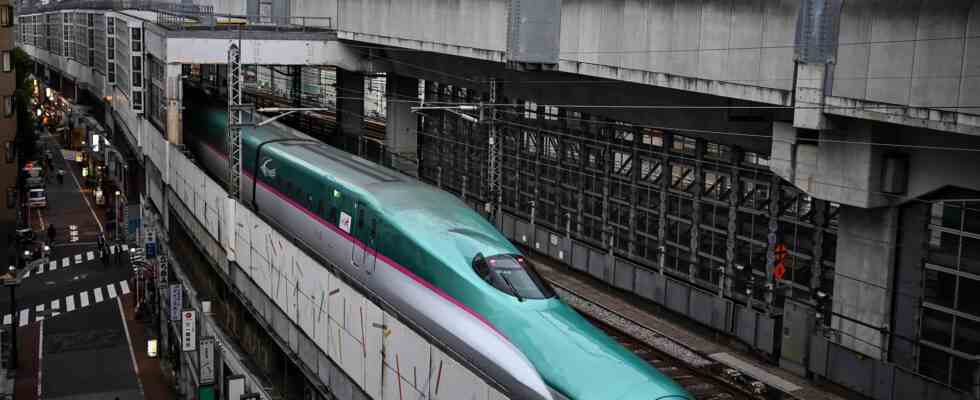Status: 12/25/2022 5:40 p.m
In Japan’s express trains, you always sit in the direction of travel and reach your destination on time 99 percent of the time. But 150 years after the first trains started in the country, there are also problems.
Tokyo station. A Shinkansen pulls in. Final destination. Before it continues, the express train stands on the track for exactly twelve minutes. Wakana Hamada from the cleaning company Tessei is already at the train, bows and then offers the disembarking passengers a plastic bag for their garbage. Once in the wagon, the 34-year-old has seven minutes to seat around 90 people. Everything has to be right: “After the seats are turned in the direction of travel, I disinfect every table, then I take care of the floor. Finally, I check again whether everything is in order,” she says succinctly.
The cleaning also clocked through
She rushes through the wagon. Table down, a quick wipe, fold, up again, neck rest down, then back, get the broom, through all rows of seats to the end, back again, then check all the seats again, change a bib here and there, get out and like on Beginning to bow to the passengers. “It’s very stressful and exhausting, but I’m trying,” she says.
The Tessei company cleans 170 trains a day. “That’s 63 million seats a year,” says deputy managing director Fumiaki Dobashi. There is enough work, but it is difficult to find staff because the cleaning job still has a bad reputation. The exact specifications for train cleaning are a bit representative of the organization of the train, with all the advantages and disadvantages.
Organized and punctual
In 1872 the first railway line was opened in Japan, but at that time almost everything was imported from Great Britain. Then, in 1964, just in time for the Olympic Games, the first Shinkansen took off. From Tokyo to Osaka with its own route.
The own routes are the main reason why the trains are almost always on time. But that’s not all, says Kiyohito Utsunomiya, economics professor at Kansai University, in an interview with the ARD: “Being on time is a matter of course for us.” And even if the train is just a minute late, apologize, that’s normal.
40 cent pay cut attracted a lot of attention
“The train drivers are also trained on this,” says Makoto Maekawa from the West Japan Railway union. High expectations that, if not met, result not only in a deep bow, but also in detention and writing letters of apology.
Or even a wage cut, as a case in the summer of 2022 showed. A train driver was deducted 40 cents from his wages for a minimal delay. He sued against it, although he won the case and got the 40 cents back, but no compensation. So nothing is likely to change in the future.
complicated network
The Japanese railway is a complicated network of many different providers. In 1987 the heavily indebted state railway was privatised. This resulted in six JR companies. “JR” stands for Japan Railways, as Japanese railways. There are also around 50 other private providers.
With around 1.5 billion passengers per month, the train is still the most important means of transport; but there is a significant disparity in coverage. The metropolitan areas are well networked, while the rural regions offer fewer and fewer services and lose millions every year. For example, JR West makes the equivalent of 4.6 million euros in deficit every year. “The population is declining, society is aging, and the train is in competition with the car.” That’s why, traffic expert Utsunomiya, sales and profits fell.
One requires the other. Fewer passengers means less service. Utsonomiya speaks of a downward spiral and advocates handing over the railways in rural areas back to the municipal or city authorities. “The railway should be common property, because it is part of mobility and increases the quality of life.” Although there have been initial talks, nothing concrete has been said yet.
Think networked – learn from Germany
In the view of the economics professor, Japan should orient itself much more closely to Germany’s rail transport, especially against the background of demographic developments. Not only is regional transport very well developed there, but various providers are also networked with each other. “There is a clock, buses and trains are coordinated, you don’t know anything like that in Japan,” complains the professor at Kansei University, who has also done research in Manchester and Vienna and is a self-confessed Germany fan.
So-called share mobility concepts, in which the car and the bike are also taken into account, are still in their infancy in Japan. If the Japanese railways want to remain competitive, they have to become more attractive, says Utsunomiya, who expressly praises Germany for the 49-euro ticket and describes it as “revolutionary”. Traveling by train in Japan is also expensive: If you take the express train, you will lose around 300 euros for a two-hour return journey. Early booking discounts do not exist.

